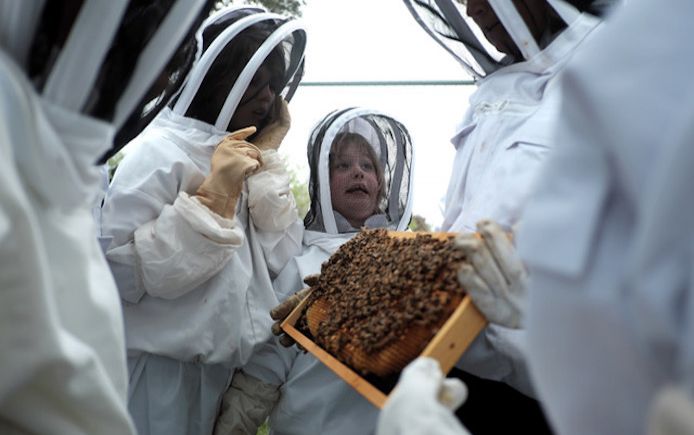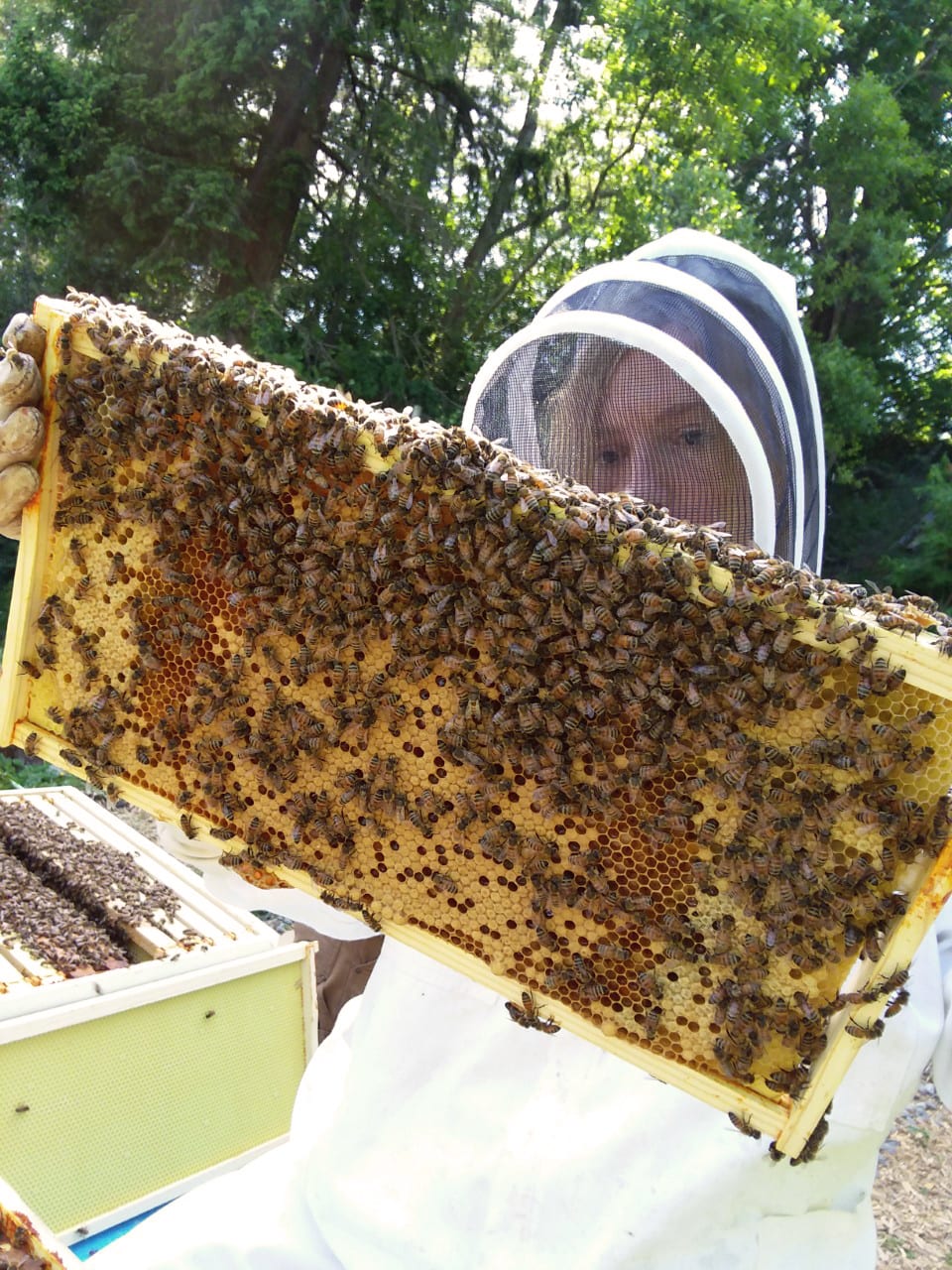Contents
- I. Introduction to Beekeeping and Education Advocacy
- II. Importance of Beekeeping Education
- III. Benefits of Beekeeping Education for Individuals
- IV. Benefits of Beekeeping Education for Communities
- V. The Role of Advocacy in Beekeeping Education
- VI. Challenges in Beekeeping Education Advocacy
- VII. Strategies for Successful Beekeeping Education Advocacy
- VIII. Frequently Asked Questions about Beekeeping and Education Advocacy
- 1. What is beekeeping?
- 2. Why is beekeeping important?
- 3. How can beekeeping contribute to education advocacy?
- 4. Are there any specific educational programs related to beekeeping?
- 5. Can anyone become a beekeeper?
- 6. What are some challenges faced by beekeepers?
- 7. How can individuals support beekeeping and education advocacy?
- 8. Can I keep bees even if I don’t have a large backyard?
- 9. Are there any safety precautions one should take when handling bees?
- 10. Can children get involved in beekeeping activities?
I. Introduction to Beekeeping and Education Advocacy

Beekeeping is an ancient practice that involves the management and care of bees for various purposes, such as honey production, pollination, and wax production. Over the years, beekeeping has gained popularity not only for its economic benefits but also for its positive impact on the environment. Additionally, there is a growing movement towards using beekeeping as a tool for education advocacy.
Education advocacy refers to efforts aimed at promoting educational opportunities and empowering individuals through knowledge acquisition. Beekeeping provides an excellent platform for engaging students and communities in hands-on learning experiences that foster environmental awareness, scientific understanding, and entrepreneurial skills.
Beekeeping in Education: A Hands-On Learning Experience
Integrating beekeeping into educational programs offers numerous benefits to students of all ages. By actively participating in beekeeping activities, students develop practical skills while gaining a deeper understanding of biology, ecology, agriculture, and sustainability.
Through direct interaction with bees and their hives, students can observe firsthand how these fascinating creatures work together in highly organized societies. They learn about the role of each individual within the hive’s social structure – from worker bees collecting nectar to nurse bees caring for larvae – fostering an appreciation for teamwork and collaboration.
Promoting Environmental Awareness
Beekeeping also serves as a powerful tool to promote environmental consciousness among students. As they tend to beehives and witness the intricate process of pollination firsthand, students become aware of the critical role that bees play in maintaining biodiversity and food security.
Understanding how human actions impact bee populations raises awareness about environmental issues such as habitat destruction or pesticide use. This knowledge empowers young learners to become advocates for sustainable practices that protect both honeybees’ habitats and other vital species.
Cultivating Entrepreneurial Skills
Engaging in beekeeping activities provides students with unique entrepreneurial opportunities. They can learn about the production and marketing of various bee products, such as honey, beeswax candles, or handmade soaps. By participating in the entire value chain, from hive maintenance to product development and sales, students develop valuable skills in business planning, financial management, and marketing.
Moreover, beekeeping-related enterprises offer an avenue for income generation within local communities. Students can develop small-scale businesses that contribute to their economic empowerment while promoting sustainable practices in honey production and environmental conservation.
II. Importance of Beekeeping Education

Beekeeping education plays a vital role in supporting the beekeeping community and promoting sustainable practices. By equipping individuals with the necessary knowledge and skills, beekeeping education ensures the well-being of honey bees, fosters environmental conservation, and contributes to local economies.
1. Promoting Bee Health
A robust understanding of bee biology, behavior, and health is crucial for beekeepers to maintain strong colonies. Through comprehensive education programs, aspiring and experienced beekeepers learn how to identify common diseases and pests that can threaten hive health. They also gain insights into preventative measures, such as proper nutrition management and hive inspection techniques.
2. Conservation Efforts
Beekeeping education also emphasizes the importance of preserving natural habitats for bees by promoting sustainable practices. By educating individuals on organic pest control methods, responsible pesticide use, and habitat restoration initiatives, we can create an environment that supports healthy populations of pollinators.
3. Environmental Stewardship
Beekeepers who are knowledgeable about environmental stewardship can make informed decisions that minimize their impact on ecosystems while maximizing honey production. Education programs teach best practices for managing beehives in harmony with local flora and fauna while safeguarding water sources from contamination.
4. Economic Benefits
The economic benefits derived from beekeeping extend beyond just honey production – they encompass various sectors within a community’s economy. Through educational initiatives focused on entrepreneurship skills development or value-added product creation (such as beeswax candles or pollen-based skincare products), aspiring entrepreneurs can start their own small businesses within this industry.
5. Research Advancements
Beekeeping education also cultivates an interest in research among enthusiasts who aspire to contribute to the field’s advancements. These individuals can play a vital role in ongoing research efforts, helping scientists gather data, test hypotheses, and develop sustainable solutions for beekeeping challenges.
III. Benefits of Beekeeping Education for Individuals

Beekeeping education offers numerous benefits to individuals who are interested in this unique hobby or profession. Whether you’re a beginner or an experienced beekeeper, investing time and effort into expanding your knowledge can have a significant impact on your success and overall satisfaction with beekeeping.
1. Enhances Understanding of Bees and their Behavior
By participating in beekeeping education, individuals gain a deeper understanding of bees’ intricate behavior patterns, instincts, and natural habitat requirements. This knowledge allows beekeepers to provide better care for their bees, ensuring their colonies remain healthy and productive.
2. Improved Hive Management Skills
Beekeeping education equips individuals with the necessary skills to effectively manage beehives throughout the year. Learning about hive inspection techniques, pest control measures, seasonal management practices, and honey extraction methods enables beekeepers to maintain thriving colonies while maximizing honey production.
3. Promotes Environmental Stewardship
Beekeepers who receive proper education on sustainable beekeeping practices become advocates for environmental conservation. They understand the vital role that bees play in pollination and ecosystem balance and actively work towards creating pollinator-friendly environments by planting nectar-rich flowers or implementing organic farming methods.
4. Expands Networking Opportunities
Beekeeping courses often bring together like-minded individuals who share a passion for bees and honey production. Engaging with fellow students or attending workshops provides excellent networking opportunities where you can exchange ideas, learn from experienced professionals in the industry, collaborate on research projects, or even find potential mentors.
5. Boosts Confidence as a Beekeeper
Gaining comprehensive knowledge through formal education helps build confidence levels among aspiring as well as seasoned beekeepers. Understanding the science behind beekeeping and acquiring practical skills through hands-on training empowers individuals to make informed decisions, tackle challenges effectively, and navigate various scenarios that may arise during their beekeeping journey.
6. Enhances Honey Quality
Education in beekeeping often emphasizes proper hive management techniques, including honey extraction methods that prioritize quality. Beekeepers who are knowledgeable about extracting honey without compromising its flavor or nutritional value can offer superior-quality honey products to consumers.
In conclusion, investing in beekeeping education offers a wide range of benefits for individuals interested in this rewarding pursuit. From gaining a deeper understanding of bees’ behavior to improving hive management skills and promoting environmental stewardship, education plays a crucial role in enhancing the overall experience and success of beekeepers. Moreover, networking opportunities and increased confidence empower individuals to become skilled practitioners who can produce high-quality honey while contributing positively to the preservation of these vital pollinators.
IV. Benefits of Beekeeping Education for Communities

Beekeeping education plays a vital role in fostering sustainable development and empowering communities. By equipping individuals with the knowledge and skills needed to engage in beekeeping practices, communities can reap numerous benefits that extend beyond honey production.
Promoting Environmental Conservation
One of the key advantages of beekeeping education is its contribution to environmental conservation efforts. As aspiring beekeepers learn about the importance of pollinators like bees, they develop a deeper understanding of their role in maintaining biodiversity and preserving ecosystems. Armed with this knowledge, community members are more likely to adopt environmentally friendly practices and actively participate in conserving natural habitats.
Enhancing Food Security
Beekeeping education also has a direct impact on food security within communities. Bees play a crucial role in pollinating crops, ensuring successful fruit set and bountiful harvests. With proper training, individuals can establish their own beehives and improve crop yield through increased pollination rates. This ultimately leads to enhanced access to nutritious food sources for both individuals and local economies.
Economic Empowerment
By providing beekeeping education opportunities within communities, economic empowerment becomes attainable for many individuals. Bee products such as honey, beeswax, propolis, and royal jelly have significant market value both locally and internationally. Through proper training on hive management, honey extraction techniques, product processing, branding strategies, marketing skills,and entrepreneurship development programs; community members can establish profitable businesses centered around apiculture activities.
Promoting Health Benefits
The health benefits associated with bee products are widely recognized across various cultures worldwide. Honey is known for its antibacterial properties while other products like propolis have proven medicinal qualities as well.Beekeeping education enables communities to tap into these health benefits and explore the potential for natural remedies and alternative medicine. By understanding the production, processing, and utilization of bee products, individuals can improve their own health while also contributing to the well-being of others.
Fostering Social Cohesion
Beekeeping education initiatives often bring together diverse groups within a community. Through shared learning experiences and collaborative activities, individuals develop social bonds and strengthen community ties. Beekeeping projects provide opportunities for cooperation, teamwork, and knowledge-sharing among participants. This fosters a sense of belonging and unity among community members, leading to increased social cohesion.
Overall, beekeeping education empowers communities by promoting environmental conservation, enhancing food security,enabling economic empowerment through apiculture-related businesses,promoting health benefits,and fostering social cohesion. By investing in beekeeping education initiatives at both local and global levels; we can create sustainable futures that benefit not only current generations but also those yet to come.
V. The Role of Advocacy in Beekeeping Education
Advocacy plays a crucial role in promoting and advancing beekeeping education, ensuring the sustainability of bee populations, and protecting the environment. By advocating for the importance of beekeeping education, individuals and organizations can raise awareness about the significant role bees play in our ecosystem and inspire others to get involved.
1. Raising Awareness
One of the primary functions of advocacy in beekeeping education is to raise awareness about the critical issues facing bees and their impact on our environment. Through educational campaigns, workshops, and public outreach initiatives, advocates can highlight the importance of pollinators like bees in maintaining biodiversity and food security.
2. Promoting Sustainable Practices
Beekeeping advocacy also focuses on promoting sustainable practices among both experienced beekeepers and those new to this field. Advocates educate individuals about responsible hive management techniques that prioritize the well-being of bees while maximizing honey production. By encouraging sustainable practices such as organic pest control methods or natural habitat preservation around hives, advocates contribute to healthier colonies and overall environmental conservation.
3. Supporting Research and Innovation
In order to advance beekeeping knowledge, advocacy efforts often involve supporting research projects that explore innovative ways to protect honeybees from threats such as diseases or pesticide exposure. Advocates collaborate with researchers by providing funding opportunities or participating in citizen science initiatives aimed at collecting valuable data for ongoing studies.
4. Influencing Policy Decisions
An essential aspect of advocacy is its ability to influence policy decisions related to beekeeping regulations at local, national, or international levels. By engaging with policymakers through lobbying efforts or public consultations, advocates can advocate for policies that promote sustainable apiculture practices while safeguarding pollinator habitats.
5. Fostering Collaboration
Advocacy also plays a significant role in fostering collaboration among beekeepers, scientists, environmental organizations, and government agencies. By bringing together various stakeholders, advocates create platforms for knowledge exchange and cooperation on initiatives such as educational programs, research projects, or policy development.
In conclusion, advocacy in beekeeping education serves as a catalyst for positive change by raising awareness about the importance of bees and their impact on our environment. Through promoting sustainable practices, supporting research efforts, influencing policies, and fostering collaboration among stakeholders, advocates contribute to the preservation of bee populations and the overall health of our ecosystem.
VI. Challenges in Beekeeping Education Advocacy
Beekeeping education advocacy faces several challenges that hinder its effectiveness and impact. These challenges arise from various factors, including the lack of awareness, limited resources, and misconceptions surrounding beekeeping.
Lack of Awareness
One major challenge in beekeeping education advocacy is the lack of awareness among the general public about the importance of bees and their role in our ecosystem. Many people are unaware of how vital bees are for pollination, food production, and biodiversity. This lack of awareness makes it difficult to garner support for beekeeping initiatives and educational programs.
Limited Resources
An additional challenge is the limited availability of resources for beekeeping education advocacy efforts. Beekeepers often struggle to access funding, training materials, and equipment necessary to educate others about beekeeping practices. Without adequate resources, it becomes challenging to reach a wider audience or provide comprehensive educational programs.
Misconceptions About Bees
Misconceptions surrounding bees also pose a significant obstacle in promoting beekeeping education advocacy. Some individuals may have negative perceptions or fears related to bees due to stings or allergies. Overcoming these misconceptions requires addressing them head-on through accurate information dissemination and highlighting the benefits that come with responsible beekeeping practices.
Resistance from Traditional Agriculture Practices
In certain regions where traditional agriculture practices dominate, there can be resistance towards adopting sustainable approaches such as beekeeping. Farmers may be hesitant to allocate land or resources for beehives due to concerns over potential risks or changes in their existing farming methods. Navigating this resistance necessitates targeted outreach efforts that emphasize how integrating beekeeping can benefit both farmers’ livelihoods and environmental conservation.
Socioeconomic Barriers
Socioeconomic barriers, such as limited access to education or resources, can also impede beekeeping education advocacy. In some communities, individuals may lack the necessary means to engage in beekeeping due to financial constraints or limited educational opportunities. Overcoming these barriers requires developing inclusive programs that cater to diverse socioeconomic backgrounds and provide support for aspiring beekeepers.
Overall, addressing these challenges is crucial for effective beekeeping education advocacy. By raising awareness, allocating resources, dispelling misconceptions, overcoming resistance from traditional practices, and addressing socioeconomic barriers, we can promote sustainable beekeeping practices and ensure a thriving ecosystem for both bees and humans alike.
VII. Strategies for Successful Beekeeping Education Advocacy
When it comes to advocating for beekeeping education, there are several strategies that can be employed to ensure success. Here are some key approaches:
Educational Partnerships
Forming partnerships with educational institutions such as schools, colleges, and universities can greatly enhance the reach and impact of beekeeping education advocacy efforts. By collaborating with these institutions, advocates can gain access to classrooms, workshops, and other educational platforms to promote the importance of beekeeping.
Community Outreach Programs
Engaging with local communities is crucial in spreading awareness about the significance of beekeeping education. Organizing outreach programs that involve interactive sessions, demonstrations, and hands-on experiences can effectively capture the attention and interest of community members. These programs can also provide opportunities for individuals to learn about sustainable practices in beekeeping.
Social Media Campaigns
In today’s digital age, social media platforms play a vital role in disseminating information and raising awareness. Utilizing social media channels like Facebook, Instagram, Twitter, and YouTube allows advocates to connect with a wider audience across different demographics. Engaging content such as videos showcasing successful beekeepers or informative infographics can generate interest in learning more about bees.
Petitioning Government Bodies
To effect lasting change within the field of beekeeping education advocacy, it is essential to engage government bodies at various levels. Drafting petitions highlighting the benefits of incorporating beekeeping into school curricula or advocating for funding initiatives aimed at supporting educational programs can lead to policy changes that prioritize this important field.
Collaboration with Beekeeper Associations
Beekeeper associations often have established networks within their respective regions or countries. Collaborating with these associations can help amplify the advocacy message and reach a larger audience. By working together, advocates can leverage the knowledge and experience of beekeepers to create impactful educational campaigns.
By employing these strategies, beekeeping education advocates can make a significant impact in raising awareness about the importance of bees and their role in our ecosystem. Together, we can ensure a sustainable future for both bees and humans alike.
VIII. Frequently Asked Questions about Beekeeping and Education Advocacy
1. What is beekeeping?
Beekeeping, also known as apiculture, is the practice of maintaining honeybee colonies for the production of honey, beeswax, and other bee-related products. It involves providing a suitable habitat for bees, managing their health and behavior to ensure their well-being, and harvesting the surplus honey.
2. Why is beekeeping important?
Beekeeping plays a crucial role in pollination, contributing to the reproduction of many plants that are essential for food production. Bees not only pollinate crops but also wildflowers and trees that support diverse ecosystems. Additionally, bee products like honey have numerous health benefits and can be used in various industries.
3. How can beekeeping contribute to education advocacy?
Beekeeping offers a unique opportunity for education advocacy by incorporating it into school curricula or community programs. It provides hands-on learning experiences about biology, ecology, agriculture, sustainability, and entrepreneurship. By engaging students or participants in practical activities like maintaining beehives or extracting honey, they gain valuable knowledge while fostering environmental stewardship.
Yes! Many educational institutions offer courses or workshops on beekeeping as part of their agricultural or environmental science programs. Additionally,
non-profit organizations often organize training sessions or mentorship programs aimed at educating individuals interested in starting their own apiaries.
5. Can anyone become a beekeeper?
Absolutely! Beekeeping is an inclusive hobby that welcomes people from all walks of life – whether you’re young or old; urban dweller or rural resident; experienced farmer or complete novice; anyone can become a beekeeper with the right knowledge and resources.
6. What are some challenges faced by beekeepers?
Beekeepers face various challenges, including hive diseases, pests like varroa mites, habitat loss, climate change affecting flower availability and weather patterns, and pesticide exposure. It requires continuous learning and adaptation to ensure the health and survival of bee colonies.
7. How can individuals support beekeeping and education advocacy?
There are several ways to support these initiatives. Firstly, you can educate yourself about the importance of bees in our ecosystem and spread awareness among your friends and family. Secondly, you can support local beekeepers by purchasing their honey or other products. Lastly, consider volunteering or donating to organizations that promote beekeeping education programs.
8. Can I keep bees even if I don’t have a large backyard?
Absolutely! Bees can thrive in urban environments too. Even if you don’t have a large backyard or garden space, you can keep bees on rooftops or balconies using specially designed beehives suitable for urban settings.
9. Are there any safety precautions one should take when handling bees?
Yes, it is essential to take necessary safety precautions when handling bees as they may sting when provoked or feel threatened.
Wearing protective clothing like veils, gloves, and suits is recommended while working with beehives to minimize the risk of getting stung.
Additionally,
learning proper techniques for approaching hives calmly reduces the chances of agitating the bees.
10. Can children get involved in beekeeping activities?
Absolutely! Beekeeping offers an excellent opportunity for children to learn about nature’s intricate workings while developing skills such as responsibility
and teamwork. However, adult supervision is crucial to ensure their safety, and it’s essential to provide age-appropriate tasks and education regarding beekeeping.

Andrew Boyer is an accomplished individual with a deep-rooted passion for bees and their conservation. Born and raised in a small town in Oregon, Andrew developed an early fascination with nature and the environment. He pursued his education at the prestigious University of Oregon, where he obtained a Bachelor’s degree in Environmental Science with a specialization in Entomology. During his time at university, Andrew conducted extensive research on the behavior and ecological impact of bees, earning him recognition from his peers and professors. His dedication to the field led him to internships at local beekeeping associations, where he honed his skills in hive management and honey production. Andrew’s expertise in beekeeping and his commitment to environmental sustainability make him a valuable asset in the conservation of these vital pollinators.
